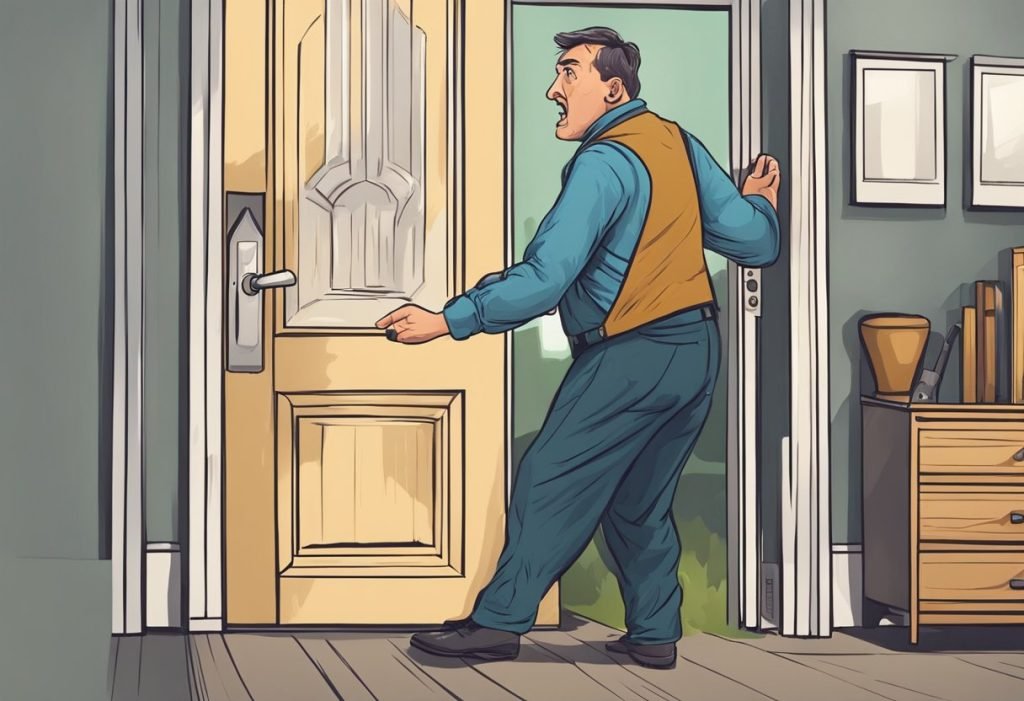Last Updated on March 18, 2024 by Kelvin Nielsen
When you’re a landlord in Florida, you have the right to access your rental property for specific reasons, such as maintenance, repairs, improvements, emergencies, and showing the property to potential renters or buyers. However, you must follow certain rules and regulations to avoid violating your tenant’s rights.
If you’re a landlord in Florida, it’s essential to understand your right to show property and how you can exercise it without infringing on your tenant’s privacy.

As a landlord, you have the right to show your rental property to potential renters or buyers, but you must follow certain guidelines. According to Florida law, you must provide reasonable notice to your tenant before entering the property, except in emergencies.
You must also enter the property at reasonable times, which are generally considered to be during normal business hours. If your tenant denies you access to the property, you cannot enter without their permission unless you have a court order or an emergency situation.
Key Takeaways
- Landlords in Florida have the right to access their rental property for specific reasons, including maintenance, repairs, improvements, emergencies, and showing the property to potential renters or buyers.
- Landlords must follow certain guidelines when exercising their right to show property, including providing reasonable notice to their tenants before entering the property and entering the property at reasonable times.
- If a tenant denies a landlord access to the property, the landlord cannot enter without their permission unless they have a court order or an emergency situation.
Related Posts:
- Landlord Harassment in Florida: Know Your Rights as a Tenant!
- Free Legal Advice for Tenants in Florida: Know Your Rights!
- Renters’ Rights in Florida Without a Lease: What You Need to Know
- When Does a Guest Become a Tenant in Florida?
- What a Landlord Cannot Do in Florida: A Comprehensive Guide
Right to Show Property
As a landlord in Florida, you have the right to show your rental property to potential renters and buyers. However, you must follow certain rules and procedures to ensure that you respect your tenant’s privacy and rights.
Notice Requirements
Before you can show the rental property, you must provide your tenants with proper notice. According to Florida law, you must provide reasonable notice to your tenants before entering the property. This notice should be in writing and should include the date, time, and reason for the visit.
The notice period should be reasonable, usually 24 hours in advance, and should be given during normal business hours. If you need to show the property outside of normal business hours, you must obtain your tenant’s consent.
Tenant Privacy
As a landlord, you must respect your tenant’s privacy. You cannot enter the rental property without proper notice, except in the case of an emergency. You also cannot enter the property for any reason not specified in the lease agreement.
Your tenants have the right to privacy, and you must respect this right. You cannot enter the property to snoop around or to check up on your tenants. If you violate your tenant’s privacy, you could be subject to legal action.
Emergency and Repair Scenarios
In case of an emergency or repair scenario, you can enter the rental property without notice. However, you should still try to provide notice if possible. You can enter the property to make necessary repairs or to address an emergency situation.
Lease Agreements and Entry Rights
As a landlord in Florida, you have the right to enter your rental unit for various reasons as specified in the lease agreement. The lease agreement is a legally binding document that outlines the terms and conditions of the tenancy, including the entry provisions.
Entry Provisions in Lease
The lease agreement should specify the landlord’s right to enter the rental unit and the notice requirements. Florida law requires that the landlord provides the tenant with reasonable notice before entering the rental unit, except in emergencies. The lease agreement should also specify the tenant’s right to privacy and peaceful enjoyment of the rental unit.
Landlord Entry for Showings
As a landlord, you have the right to show the rental unit to potential renters or buyers. However, you must provide the tenant with reasonable notice before entering the rental unit for showings. The notice should include the date, time, and purpose of the entry.
Tenant’s Rights and Responsibilities
As a tenant, you have the right to privacy and peaceful enjoyment of the rental unit. You also have the responsibility to maintain the rental unit and pay rent on time. If you violate the terms of the lease agreement, the landlord may have the right to enter the rental unit without notice.
Resolving Disputes and Violations
When Tenants Can Withhold Rent
If your landlord violates your rights, you may be able to withhold rent until the issue is resolved. However, it is important to note that you must follow certain procedures to do so legally. If you withhold rent without following the proper procedures, you may be subject to eviction.
You may be able to withhold rent if your landlord fails to make necessary repairs or if they violate your right to privacy by entering your rental unit without giving proper notice.
Legal Actions Against Violations
If your landlord violates your rights and you cannot come to a resolution on your own, you may need to take legal action. You may be able to file a complaint with the Florida Department of Business and Professional Regulation.
If your landlord has violated the terms of your lease agreement, you may be able to take legal action in small claims court. If you believe that your landlord has engaged in discrimination or retaliation, you may be able to file a complaint with the appropriate agency.
Seeking Legal Assistance
If you are unsure of your rights as a tenant or if you need assistance in resolving a dispute with your landlord, you may want to seek the assistance of an attorney. An attorney can help you understand your rights and can provide guidance on how to proceed with legal action.
Related Post: Renters’ Rights in Florida for Repairs: Know Your Legal Protections
Frequently Asked Questions: Florida Landlord Right To Show Property

What notice must a Florida landlord provide before entering a rental property for showings?
Florida law requires landlords to provide reasonable notice before entering a rental property for showings. The notice period should be at least 12 hours, but it can be longer if agreed upon by both parties. The notice must be in writing and should include the date, time, and purpose of the entry.
Under what circumstances can a Florida tenant legally refuse property viewings?
Florida tenants have the right to refuse property viewings if the landlord does not provide reasonable notice or violates the tenant’s privacy rights. Landlords cannot enter a rental property without the tenant’s consent, except in cases of emergencies or court orders.
What are a tenant’s rights regarding repairs and maintenance entry in Florida?
Florida landlords have the right to enter a rental property to perform repairs and maintenance, but they must provide reasonable notice to the tenant. The notice period should be at least 12 hours, but it can be longer if agreed upon by both parties. Tenants have the right to request repairs and maintenance, and landlords must respond to these requests in a timely manner.
Are Florida landlords allowed to enter a property for showings without the tenant’s consent?
Florida landlords cannot enter a rental property for showings without the tenant’s consent, except in cases of emergencies or court orders. Landlords must provide reasonable notice to the tenant before entering the property for showings. The notice period should be at least 12 hours, but it can be longer if agreed upon by both parties.
How does Florida law regulate a landlord’s access to a property for utility management?
Florida landlords have the right to enter a rental property to manage utilities, but they must provide reasonable notice to the tenant. The notice period should be at least 12 hours, but it can be longer if agreed upon by both parties. Landlords cannot shut off utilities to force a tenant to vacate the property.
What actions can a tenant take if a landlord violates entry rights in Florida?
Florida tenants can take legal action against landlords who violate their entry rights. Tenants can file a complaint with the local housing authority, seek an injunction to prevent future violations, or even terminate the lease agreement.
Conclusion
In summary, as a landlord in Florida, you have the right to show your rental property to potential renters and buyers. However, you must follow certain procedures and respect your tenant’s privacy and rights. Make sure to provide proper notice, respect your tenant’s privacy, and only enter the property for valid reasons such as emergency or repair scenarios.
Sources: Florida Renters Rights Guide, Florida Landlord Tenant Rights,

Amanda Rose is a seasoned landlord with 13+ years of expertise in overseeing diverse properties. Her adept management spans single and family homes, along with multi-family apartments and condos, across Wyoming and South Dakota. Her commitment and proficiency have cemented her status as a thriving property management professional.
She is a member of the following organizations: Wyoming Landlord’s Association, National Association of Residential Property Managers (NARPM), Wyoming Apartment Association, South Dakota Multi-Housing Association (SDMHA), and South Dakota Landlord Association (SDLA).







